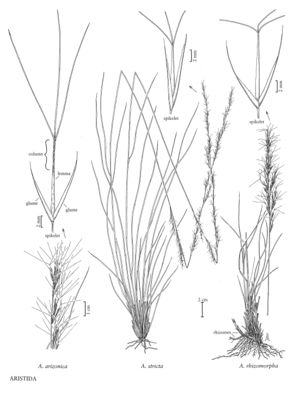Aristida arizonica
Plants perennial; usually cespitose, occasionally with rhizomes. Culms 30-80(100) cm, erect, unbranched. Leaves mostly basal; sheaths usually longer than the internodes, mostly glabrous, throat sometimes with hairs, not disintegrating into threadlike fibers; collars glabrous or with hairs at the sides; ligules 0.2-0.4 mm; blades 10-25(30) cm long, 1-3 mm wide, usually flat, often curling like wood shavings when mature, glabrous. Inflorescences spikelike panicles, 10-25 cm long, 1-3 cm wide; nodes glabrous or with straight, about 0.5 mm hairs; primary branches 2-6 cm, appressed, without axillary pulvini, with 2-8 spikelets. Glumes 10-15(18) mm, brownish, acuminate to awned, awns to 3 mm; lower glumes slightly shorter than to equaling the upper glumes, 1-2-veined; calluses 1-1.8 mm; lemmas 12-18 mm, glabrous, rarely sparsely pilose, terminating in a 3-6 mm twisted column, junction with the awns not conspicuous; awns 20-35 mm, straight to curved basally, ascending distally, not disarticulating at maturity; central awns 20-35 mm; lateral awns slightly shorter than the central awns; anthers 3, 1.3-1.9 mm. 2n = 22.
Distribution
Okla., N.Mex., Tex., Utah, Colo., Ariz., Nev.
Discussion
Aristida arizonica grows in pine, pine-oak, and pinyon-juniper woodlands from the southwestern United States to southern Mexico. It may be confused with A. purpurea var. nealleyi, but differs in having flat, curly leaf blades and longer awns.
Selected References
None.
